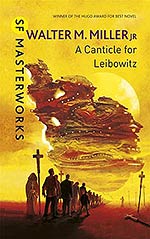
![]() devilinlaw
devilinlaw
11/4/2015
![]()
Let me preface this review by first stating that I am an atheist. I was baptized Catholic when I was an infant but neither of my parents stayed long in the church after their divorce when I was five or six.
A Canticle for Leibowitz was an interesting story. The narrative takes place over three separate time periods divided by centuries. It is the story of civilization (and the Catholic Church) rebuilding itself from the ashes of nuclear war. When all knowledge of science and history is lost, a small enclave of monks in the deserts of the what was once the Southwest United States save books and other "Memorabilia" from "before the Flame Deluge" for future generations.
Mixing tales of church bureaucracy, post-apocalyptic political machinations and personal spiritual conflicts with ease, the only time I really felt the heavy-handedness of any religious ideology was during the third part, "Fiat Voluntas Tua." In that story, the Abbot of the age staunchly opposes the euthanasia practices advocated by the men of science in the wake of another nuclear attack. He adamantly refuses to approve of the mercy killing of a badly injured mother and daughter, even getting into a conflict with law enforcement over the issue. In a twist of sad irony, the author took his own life in 1996 after decades of dealing with debilitating depression.
The novel is by turns funny and thought-provoking and while I could do without the religious proselytizing, it wasn't the main focus of the story so it was easy to look past. Instead what jumped out at me were the little things that got distorted with time and/or lack of context. When Brother Francis finds the bomb shelter in the first story, "Fiat Homo," he muses over the "demon" called "Fallout," thinking of it as a flesh and blood creature from the pits of Hell. He is also baffled by what the blessed Beate Leibowitz might have meant by "pound pastrami, can kraut, six bagels." Brother Francis was my favorite character in the book and his fate (no spoilers here) took me quite by surprise.
I "read" this as an audiobook, narrated by Tom Weiner. The production was good quality and Weiner gives each characters its own unique voice, varying in accent and tonal qualities. Weiner gave the narration almost like a documentary voice over but the characters were far from lifeless.
Multilayered and complex, this will be a book that I will read again in a few years to see what that future version of myself will get out of it next time.